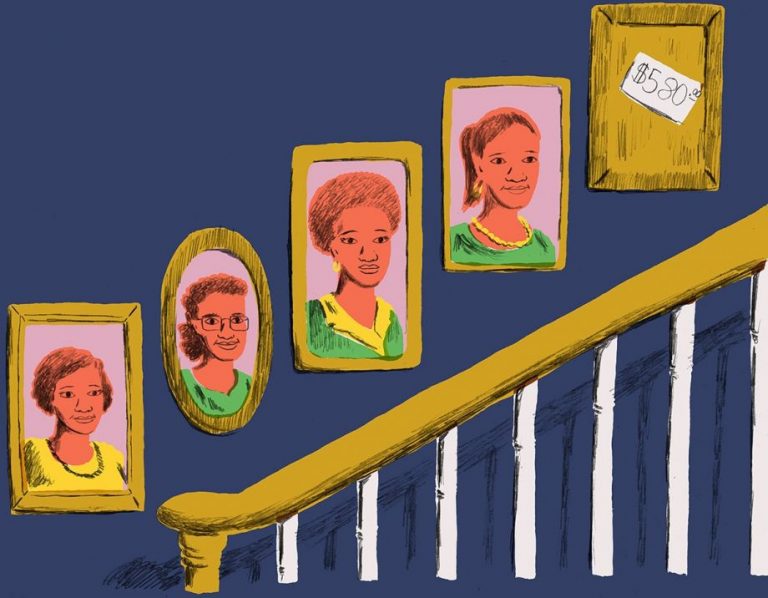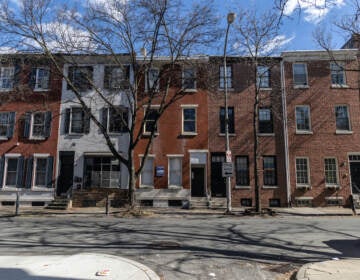The government fee that can cost poor Philadelphians their inheritance
In a city where a quarter of households earn less than $1,000 a month, many surviving family members struggle to pay off these bureaucratic fees.

(Illustration by Steve Teare)
Ora Henry’s family has lived in the shadow of Temple University Hospital since 1954. Four generations have taken shelter, at various times, in a large three-story rowhome that her grandmother, Mary Henry, owned outright.
But, a few years back, Mary Henry began losing her mental faculties. Then, in January 2018, she died.
Along with the hammerblow of losing the matriarch of the family, Ora Henry and her mother also had to quickly grapple with the process of taking possession of a home they had always thought of as their own.
“She bought this home for family and she expected it to be here for us when she was gone,” Henry says.
But like many places in America, being willed a property isn’t enough. Philadelphia assesses something called a probate fee — $580 — the Henrys would learn they needed to pay City Hall just to process their inheritance.
It may not sound like much, but to Ora Henry, who makes $12-an-hour as a social worker, and her mother, who was recently reduced to part-time hours at her job, it meant a lot.
On top of funerary expenses, that $580 fee represents skipped groceries to feed her mother and two daughters, or utility bills left unpaid and shut-off warnings. Before her death, family members discovered that Mary Henry had taken out a reverse mortgage in her waning days to cover her expenses. They were on the hook for those payments, too.
Even though they were eventually able to scrape the cash together for the fee, Henry weeps as she recounts these hard times.
“It was that some things just had to not get paid,” Henry recalls, through tears. “I don’t mind doing it, I’ll pay my way. But it just feels like I’m always broke.”
In a city where a quarter of households earn less than $1,000 a month, many surviving family members struggle to pay off these bureaucratic fees. Sometimes they are more than mere obstacles. Sometimes these fees can become a brick wall to the only wealth some families may ever realize. That’s in the context of a country where the median net worth of white households is ten times that of black households, according to researchers at the Federal Reserve.
According to Kelly Gastley, an attorney with the legal aid group PhillyVIP, people in dire economic straits routinely give up trying to pay off probate fees altogether, triggering a host of consequences.
“They’re told there’s a $300 to $500 filing fee and they get stuck because they don’t have the money,” Gastley says.
Gastley explains that groups like hers get involved down the road after that small decision has snowballed into a legal mess. Residents living in a home that is, effectively, owned by a deceased relative can be denied access to utility assistance programs or home repair grants.
If a home was already headed towards foreclosure, some banks will stop accepting payment from anyone except the titleholder. In these cases, a saga that starts with a skipped fee can end with someone losing their house. Deed theft, an endemic problem in Philadelphia, is made easier when the title to a home is held by the dead.
“[Bequeathed properties] often have a lot of other issues going on, like delinquent taxes, back utilities or home repairs, and then these other problems start to multiply because of the tangled title. Then you need a lawyer to help you keep your home,” Gastley says. “This is a process that shouldn’t require a lawyer. But I can’t tell you how many clients we see because they got stuck on the [probate filing] fee.”
The last time her office checked, in 2007, there were some 14,000 residences in Philadelphia owned on paper by an individual who was likely deceased. But Gastley says that it doesn’t have to be this way. Over a year ago, another legal aid group, Community Legal Services, raised the issue with the Register of Wills, a colonial-era branch of Philadelphia’s municipal government that oversees probate fees.
Community Legal Services asked for the office to consider waiving these fees for very low-income residents. It would have little impact on the department’s $6 million budget, the lawyers argued.
“I don’t believe it would actually decrease the amount of fees. What we’re seeing is people start the process and then give up,” says Community Legal Services attorney Michael Froehlich. “I thought the meeting went well. But then, nothing.”
Louis DiRenzo, deputy register of wills in charge of probate services, says that while his office was sympathetic to pleas for aid, he says it was simply out of their hands. DiRenzo says he was told by the courts that oversee their office’s operations “that state law mandated these fees.”
“It’s a sad situation. Would I be against [a fee waiver]? No, providing you met a certain criteria. Criteria that ensures this procedure or process isn’t abused,” DiRenzo says. “But the Register of Wills doesn’t have the authority to waive the fee.”
DiRenzo notes that these fees were pegged to the value of the property and were sometimes only half of what the Henrys paid. He says that, compared to inheritance tax or back mortgage payments, a couple hundred dollars wasn’t much to ask for. After all, inheritors could be walking away with valuable property.
“With the hot real estate market in Philadelphia these days … There’s a possibility of a capital gain once they transfer in their name, where they’re walking away with real dollars,” DiRenzo says.
However, Gastley says the state charter outlines much lower fees than what the Register of Wills currently charges. She also notes that the state charter only requires that the office assess the fees. Nothing says the office has to actually collect the money.
The Register of Wills may also have some financial interest in maintaining the status quo. Philadelphia’s anti-poverty office gives PhillyVIP a $162,500-a-year grant to pay off probate filing and other fees on behalf of low-income residents. That money ultimately goes back to the Register of Wills.
Gastley says the absurdity of the situation was not lost on her attorneys.
“So many of us have said, so many times, that this is basically the city giving us money so we can pay back the city,” she says.
The Henry family is supposed to be a case with a happy ending. But paying probate fees was hardly the end of Henry’s struggles in North Philadelphia. On top of raising her children, both Henry and her mother are dealing with their own medical issues. Their home is in need of repair work, but the reverse mortgage payments they’re still saddled with eats up most of Ora’s income each month, a debt that was never her own.
“If it’s not one thing it’s another … and the funds that I have aren’t adding up to pay for all of this,” she says. “I just wished that my grandma let me know how bad things had gotten for her.”
While probate fees may be small in light of a lifetime of burdens, Gastley says no one should be forced to go hungry over a processing fee.
“These are choices people shouldn’t have to make to save their home,” says Gastley.
 Next City is one of 19 news organizations producing Broke in Philly, a collaborative reporting project on solutions to poverty and the city’s push toward economic justice. Read more at BrokeInPhilly.org and follow us on Twitter @BrokeInPhilly.
Next City is one of 19 news organizations producing Broke in Philly, a collaborative reporting project on solutions to poverty and the city’s push toward economic justice. Read more at BrokeInPhilly.org and follow us on Twitter @BrokeInPhilly.
EDITOR’S NOTE: We’ve clarified this article to reflect the correct level of funding from City of Philadelphia for PhillyVIP to pay probate filing and other fees on behalf of low-income residents, as well as what that grant is used for.
WHYY is your source for fact-based, in-depth journalism and information. As a nonprofit organization, we rely on financial support from readers like you. Please give today.




